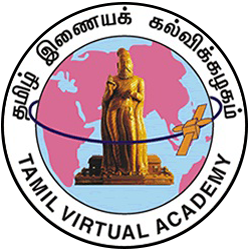Primary tabs
-
Kovai literature is one of the Sittrilakkiyangal in Tamil. It is also called அகப்பொருள் கோவை. It is dramatic in nature. This lesson explains what Kovai literature is, with the help of Thirukkovaiyaar.
What is the meaning of Kovai? That which is strung properly. Which are the types that have been strung properly? Various aspects of filial life have been dealt with, in the form of a complete work. Hence it is called Kovai literature. The poets have arranged the different verses relating to family life, in proper order, so that they form a chain.
We can say that the ideas put forward by Tholkappiar in the chapter on "Porul", served as the nuclei for Kovai literature. Several grammatical works like இறையனார் அகப்பொருள், மாறன் அகப்பொருள், நம்பி அகப்பொருள், appeared after Tholkaappiam. Later poets engaged themselves in an effort to produce literature that would illustrate the ideals of family life put forth by these grammatical works. Kovai literature is the result of their efforts. We can cite as examples Paandikovai, and Thanjaivaanan Kovai. They are illustrative of the two grammatical works of இறையனார் அகப்பொருள் and நம்பி அகப்பொருள் respectively.
Among the various types of Sangam literature, நற்றிணை, குறுந்தொகை, ஐங்குறுநூறு, கலித்தொகை and அகநானூறு are devoted wholly to family life. Kovai literature is also believed to have originated from these works. We can also consider the verses contained in the section "காமத்துப்பால்" of the Thirukkural, as forming the embryo of Kovai literature.
In religious literature many poetic works have been produced, in which the writer imagines God as the hero and himself as the heroine. These works too may have inspired Kovai literature. Thus both grammatical and literary works have formed the basis of Kovai literature.
The earliest work of Kovai literature is said to be Paandikkovai, written in the 7th century. The author of this work in not known. The next to appear, was திருக்கோவையார், followed by தஞ்சைவாணன் கோவை in the 13th century. It was Poyyamozhi Pulavar who wrote the last mentioned work. Todate, seventy Kovai works are supposed to have been written.
Instead of singing 400 verses on several aspects of family life, it became traditional to compose 400 verses on a single aspect. This kind of work came to be classified as துறைக்கோவை. It has 400 verses in 25 cantos.
This lesson teaches you what Kovai literature is, its origin, its special features, and about Thirukkovaiyaar and the greatness of Lord Siva, the hero.


